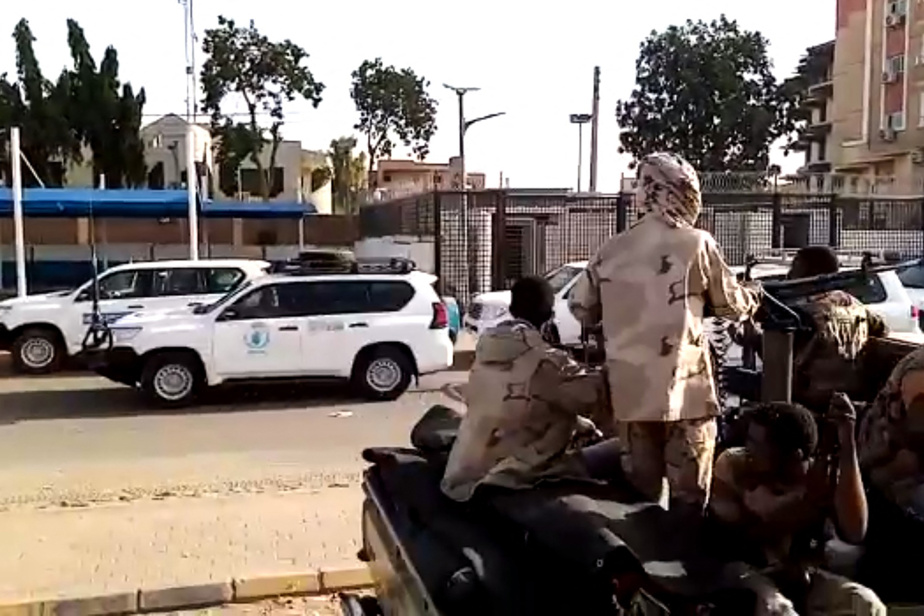(Khartoum) France and other countries began evacuating their nationals from Sudan on Sunday, after the departure of American diplomatic personnel, while deadly fighting between the army and paramilitaries has raged for more than a week.
According to testimonies collected by AFP, gunfire and explosions again shook the capital, Khartoum, and its suburbs on Sunday, overflown by fighter jets.
Pope Francis called for “dialogue” in the face of the “serious” situation in the country, where, since April 15, the two generals in power since their 2021 putsch have embarked on a merciless war.
The violence, mainly in Khartoum and Darfur (West), has left more than 420 dead and 3,700 injured, according to the World Health Organization (WHO).
They have displaced tens of thousands of people to other states in Sudan, or to Chad and Egypt, while several countries are mobilizing to evacuate their nationals.
France announced on Sunday that it had begun a “rapid evacuation operation” of its nationals and diplomatic personnel. Europeans and people from “allied partner countries” are also supported.
US President Joe Biden had earlier announced that the military had “conducted an operation to extract US government personnel from Khartoum”.
A “just under a hundred” people, including several foreign diplomats, were evacuated in a helicopter operation, said senior State Department official John Bass. But not the other American nationals, who would be several hundred in Sudan, whose evacuation is not planned “for the moment”.
Italy also indicated that it would try to evacuate its nationals on Sunday, as did Turkey and other countries.
According to video images collected by AFP, dozens of UN vehicles were leaving the capital on Sunday, as were many buses, which were heading for Port Sudan, in the east of the country. It was not immediately possible to know who was on board.
For researcher Hamid Khalafallah, “calling for safe corridors to evacuate foreign nationals without at the same time calling for an end to the war would be terrible”.
“International actors will have less leverage once they leave the country: do what you can to leave safely but don’t leave the Sudanese behind unprotected,” the Sudan expert argues.
In Khartoum, the five million inhabitants fear a resurgence of violence after the departure of foreigners, in their city deprived of running water and electricity, with often faulty telephone and internet networks.
Army air raids and paramilitary cannon fire have already destroyed or forced the closure of “72% of hospitals” in combat zones, according to the doctors’ union.
In the streets, lampposts are lying on the ground, burnt shops are still smoking. Here, a bank was gutted. There, despite everything, a mechanic tries to keep his shop open in case one of the very few passers-by needs his services.
The conflict erupted on April 15 between the army of General Abdel Fattah al-Burhane, Sudan’s de facto ruler, and his deputy-turned-rival, General Mohamed Hamdane Daglo, who commands the much-feared paramilitary Rapid Support Forces (RSF). ).
The two generals took power in the 2021 coup, halting the process towards a democratic transition that followed the fall of dictator Omar al-Bashir in 2019.
But they were unable to agree on the integration of the FSR into the regular troops, after months of political negotiations under international auspices.
On Friday, the army and the RSF announced, separately, a three-day ceasefire for Eid al-Fitr, the holiday that marks the end of Ramadan. The two opponents, however, immediately accused each other of violating the truce.
While the two sides are also engaged in an information war, it is impossible to know who controls the country’s airports and what state they are in after being the scene of heavy fighting since the first day of the conflict.
This week, Eid al-Fitr has had a bitter taste for the people of Khartoum. The holiday is usually celebrated “with pastries and gifts for the children”, but this year it is “gunshots and the smell of death”, said one of them Sami al-Nour.
Living conditions are probably worse in Darfur, the scene of a terrible conflict in the 2000s, where no one can go immediately. On site, a doctor from Médecins sans frontières (MSF) evokes a “catastrophic situation”.
In Sudan, Africa’s third-largest gold producer yet one of the world’s poorest countries, health services have been on their knees for decades and a third of its 45 million people go hungry.
The cessation of operations by most humanitarian organizations will worsen the situation. And the conflict now threatens to gain ground beyond Sudan’s borders, experts say.

